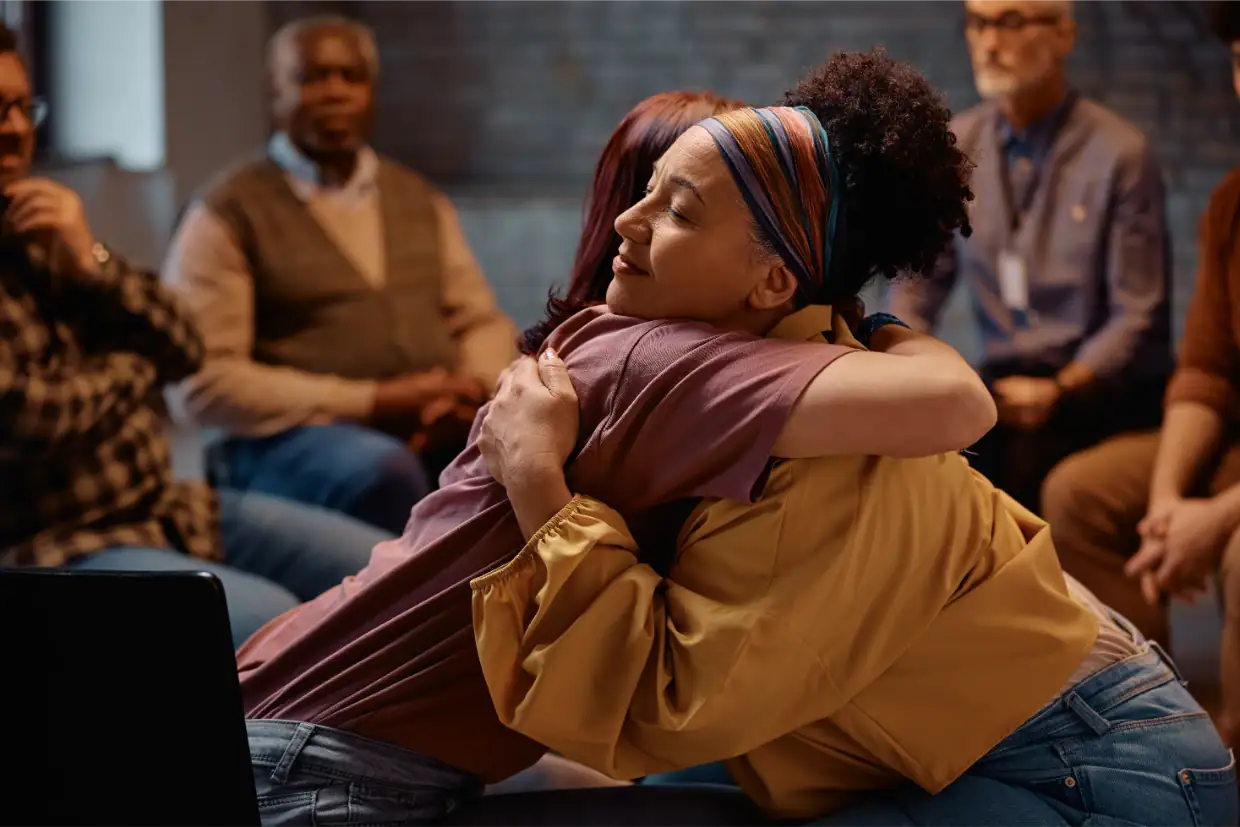PTSD Treatment at Summit at Knoxville
Post-Traumatic Stress Disorder (PTSD) is a debilitating mental health condition that can develop after a person has experienced or witnessed a traumatic event. It goes beyond the initial shock and distress, leaving individuals re-experiencing the trauma, avoiding reminders, experiencing negative thoughts and feelings, and showing heightened reactivity. Living with PTSD can feel like being constantly on edge, trapped in the past, and disconnected from the present.
At Summit at Knoxville, we understand the profound and lasting impact of trauma, and we offer a comprehensive, trauma-informed treatment program designed to help individuals process their experiences, manage symptoms, and reclaim their lives. Located at 1016 Ic King Rd, Seymour, TN 37865, we are a dedicated resource for those seeking healing in East Tennessee.

Understanding Post-Traumatic Stress Disorder (PTSD)
PTSD can develop after exposure to any severe trauma, such as combat, physical or sexual assault, accidents, natural disasters, or the sudden death of a loved one. Its symptoms are categorized into four main clusters:
- Intrusion: Flashbacks, nightmares, or intrusive thoughts about the traumatic event.
- Avoidance: Efforts to avoid thoughts, feelings, or external reminders of the trauma (e.g., places, people, activities).
- Negative Alterations in Cognitions and Mood: Persistent negative beliefs about oneself or the world, distorted blame, feeling detached from others, inability to experience positive emotions.
- Alterations in Arousal and Reactivity: Irritability, angry outbursts, reckless behavior, hypervigilance (being constantly on guard), exaggerated startle response, and sleep disturbances.
Untreated PTSD can lead to severe impairment in daily functioning, strained relationships, occupational difficulties, and a significant reduction in overall quality of life. The constant internal struggle often pushes individuals towards isolation or self-medication.

PTSD and Mental Health in Tennessee
The widespread impact of trauma and PTSD contributes significantly to the mental health landscape in Tennessee:
- Any Mental Illness (AMI): Nearly 26.48% of adults (18+) in Tennessee experienced AMI. Many anxiety disorders and depressive conditions, which frequently co-occur with PTSD, fall into this category.
- Child Trauma: Nationally, 32.2% of child patients (0-17) receiving public mental health services were diagnosed with trauma/stressor-related disorders. This highlights the early onset of trauma’s impact and the long-term risk of conditions like PTSD if not addressed early.
- Co-occurring Conditions: PTSD has a very high comorbidity rate with other mental health challenges, including depression, anxiety disorders, and, critically, substance use disorders. Many individuals with PTSD attempt to self-medicate their distress, nightmares, or hyperarousal with alcohol or drugs.
- Barriers to Treatment: Stigma, fear of re-experiencing trauma, and a belief in “self-sufficiency” often prevent individuals from seeking help. A specialized, supportive environment can help overcome these barriers.

These statistics underscore the vital importance of accessible, compassionate, and trauma-informed treatment for PTSD in our community.
Why Choose Summit at Knoxville for PTSD Treatment?
At Summit at Knoxville, our PTSD Treatment program is designed to provide the intensive, specialized, and supportive environment crucial for healing from trauma and managing its lasting effects:
- Trauma-Informed Care: Our entire approach is grounded in understanding the impact of trauma. We prioritize creating a sense of safety, trustworthiness, peer support, collaboration, and empowerment throughout your treatment journey.
- Expert Multidisciplinary Team: Our dedicated team includes experienced licensed therapists specializing in trauma, and medical professionals led by our Medical Director, Dr. Brian Fuller, MD, a board-certified psychiatrist. Dr. Fuller is particularly passionate about helping people who have survived trauma, recognizing that the life they deserve is within reach. This expertise ensures comprehensive psychiatric evaluation and responsible medication management when appropriate.
- Personalized, Phased Treatment: Healing from trauma is a process. Your treatment plan will be highly individualized, focusing on three key phases: safety and stabilization, trauma processing, and reintegration, tailored to your unique experiences and readiness.
- Structured & Supportive Environment: Our residential setting provides a consistent daily routine, removing external stressors and allowing for full immersion in therapy and healing without daily triggers.
- Integrated Co-occurring Disorder Treatment: We recognize the high comorbidity of PTSD with substance use. Our integrated model allows for the simultaneous treatment of PTSD alongside any co-occurring mental health conditions or substance use disorders, providing comprehensive healing.
- Holistic Wellness: We emphasize the connection between mind and body, incorporating nutritious meals prepared by an on-site chef, and recreational activities like guided morning hikes and outdoor basketball to support overall well-being and nervous system regulation.
Our Comprehensive Approach to PTSD Treatment
Summit at Knoxville’s PTSD Treatment program integrates a variety of evidence-based therapies and strategies proven effective in processing trauma and alleviating PTSD symptoms:
- Individual Therapy: One-on-one sessions are central to trauma processing. Therapists utilize specific trauma-focused interventions (such as elements of Cognitive Processing Therapy or Prolonged Exposure, adapted to a residential setting) to help patients safely confront and reprocess traumatic memories and beliefs.
- Group Therapy: Group sessions provide a vital community where patients can share experiences in a safe, supported environment, reduce feelings of isolation, and learn from peers. They also provide opportunities for psychoeducation on trauma responses and coping skills.
- Cognitive Behavioral Therapy (CBT): Especially trauma-focused CBT, helps patients identify and challenge distorted thoughts and beliefs related to the trauma, reducing guilt, shame, and self-blame.
- Dialectical Behavior Therapy (DBT): DBT skills are crucial for individuals with PTSD, particularly for enhancing emotional regulation, distress tolerance, and interpersonal effectiveness. These skills help manage intense emotional flashbacks and avoid maladaptive coping.
- Motivational Interviewing (MI): MI can be utilized to help patients explore their readiness for trauma processing and strengthen their intrinsic motivation for healing and change.
- Psychoeducation: Understanding PTSD, the brain’s response to trauma, and the purpose of treatment is empowering. Our program provides comprehensive psychoeducation for patients and their families, normalizing reactions and building a framework for recovery.
- Medication Management: For some individuals, medication can be an effective adjunct in managing severe PTSD symptoms like nightmares, hyperarousal, or co-occurring depression/anxiety. Under the careful oversight of Dr. Fuller, patients receive expert psychiatric evaluation and ongoing medication management to find the optimal regimen.
- Holistic Wellness: We integrate physical activities like guided morning hikes and outdoor basketball, along with nutritious meals prepared by an on-site chef. These elements support overall physical health and help regulate the nervous system, which is often dysregulated in PTSD.
What to Expect During Residential PTSD Treatment
In our residential program, patients receiving PTSD treatment will experience a structured yet nurturing daily routine focused on trauma recovery and skill acquisition:
- Safety and Stabilization: Initial focus on building coping skills, emotional regulation, and establishing a sense of safety within the structured environment.
- Consistent Structure: A regular daily schedule provides predictability and reduces the hypervigilance often associated with PTSD.
- Intensive Therapeutic Engagement: Days are filled with individual and group therapy, therapeutic check-ins, and workshops tailored to trauma processing and skill-building.
- Supportive Environment: Our facility is designed to minimize distractions and create a safe space for difficult emotional work.
- Peer Support: You will live and learn alongside others committed to mental wellness, fostering a powerful sense of connection and reducing isolation.
Our environment is optimized for healing; cell phones are generally not permitted unless clinically approved, and an initial 5-day blackout period applies to phone use upon admission to ensure full immersion in the therapeutic environment.

Beyond Treatment: Sustaining Healing from Trauma
Completing residential PTSD treatment is a significant achievement, providing a strong foundation for continued healing and a more integrated life. At Summit at Knoxville, we emphasize robust aftercare planning to ensure sustained well-being. Our team works diligently with you to develop a comprehensive plan that may include:
- Connecting with outpatient trauma-focused therapy for continued processing and skill reinforcement.
- Establishing ongoing psychiatric care for continued medication management, if applicable.
- Identifying local support groups or community mental health resources specifically for trauma survivors.
- Developing personalized relapse prevention plans for managing potential triggers and symptoms.
Our goal is to equip you with the tools and support network necessary to live a life no longer defined by trauma.
Accessible PTSD Treatment in East Tennessee
Summit at Knoxville is deeply committed to making high-quality PTSD treatment accessible to our community. We accept a wide range of insurance plans, including BCBS, Cigna, Ambetter, Aetna, UnitedHealthcare, Magellan, Humana, Optum, and VA CCN. Flexible self-pay options are also available.
Our admissions team can assist you in verifying your insurance benefits and guiding you through the payment process.
Take the Step Towards Healing and Wholeness
If you or a loved one is struggling with PTSD and seeking comprehensive, trauma-informed, expert-led treatment in a supportive environment, Summit at Knoxville is here to help. Our dedicated team is ready to support you in processing your past, managing your symptoms, and building a future defined by resilience and peace.
Reach out to us today. Call our main line at (865) 345-3415 to speak confidentially with our admissions team, ask questions, or begin the admissions process.
Your journey to lasting healing and a brighter future starts here.
